
Cleistocactus strausii, the silver torch or wooly torch, is a perennial flowering plant in the family Cactaceae. It is native to mountainous regions of Department Tarija, Bolivia, at 1,500–3,000 m (4,921–9,843 ft).

Samaipaticereus is a genus of cactus containing the sole species Samaipaticereus corroanus. It is known only from East Andean Bolivia and Peru.

Cleistocactus hyalacanthus is a species of columnar cacti in the genus Cleistocactus. The name comes from the Greek kleistos meaning closed because the flowers hardly open.

Cleistocactus samaipatanus is a species of flowering plant in the family Cactaceae, native to Bolivia.

Cleistocactus morawetzianus is a species of columnar cactus in the genus Cleistocactus, endemic to Peru.

Cleistocactus tominensis is a species of columnar cactus in the genus Cleistocactus, endemic to Bolivia, where it is found in forests, on cliffs, and in inter-Andean valleys at altitudes of 900 to 2,200 meters.

Soehrensia formosa, is a species of Echinopsis found in South America. In north-western Argentina, Bolivia and northern Chile. First published in Cactac.: Handb. Kakteenk. 3: 1678 in 1959.
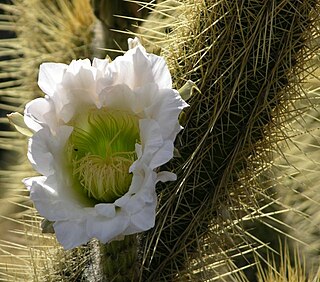
Soehrensia camarguensis, is a species of Soehrensia found in Bolivia.

Echinopsis tacaquirensis, is a species of Echinopsis found in Bolivia.
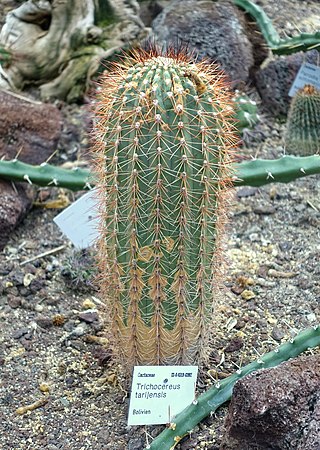
Soehrensia tarijensis, is a species of Soehrensia, in the cactus family. It is native to Bolivia and northwestern Argentina.
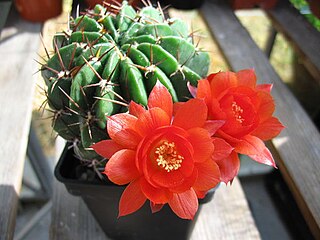
Lobivia maximiliana, is a species of Lobivia found in Bolivia and Peru.

Mirabella estevesii, synonym Cereus estevesii, is a species of columnar cactus found in Minas Gerais, Brazil. The first description was published in 2004 by Pierre Josef Braun as Cereus estevesii.
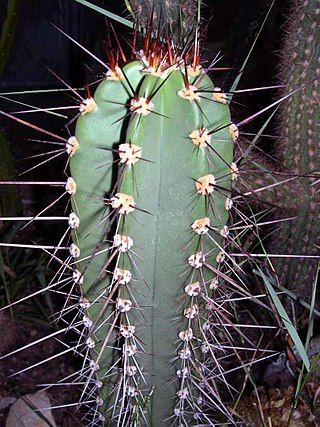
Neoraimondia herzogiana is a tree-like cactus native to Bolivia.
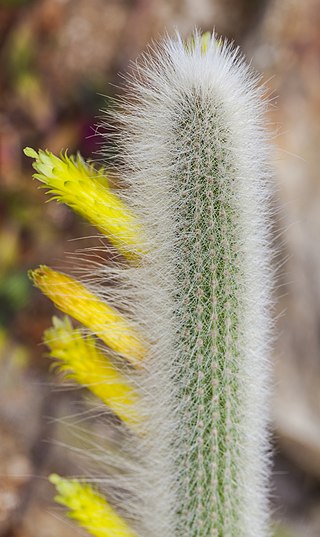
Cleistocactus ritteri is a species of Cleistocactus found in Bolivia.

Cleistocactus smaragdiflorus is a species of Cleistocactus found in Bolivia and Argentina.

Cleistocactus baumannii is a species of Cleistocactus found in Argentina, Paraguay, Bolivia, Uruguay, and Brazil.
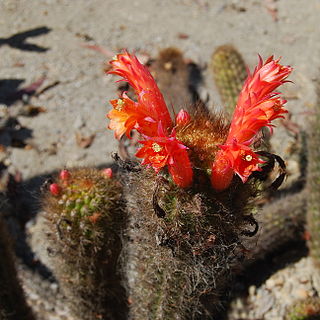
Loxanthocereus acanthurus is a species of Loxanthocereus found in Peru.

Cleistocactus brookeae is a species of columnar cacti in the genus Cleistocactus.

Cleistocactus buchtienii is a species of columnar cacti in the genus Cleistocactus.
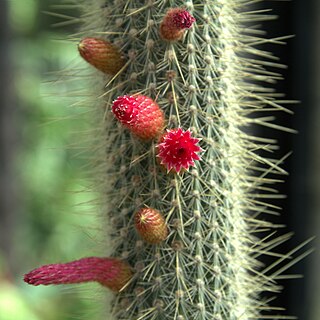
Cleistocactus parviflorus is a species of columnar cacti in the genus Cleistocactus.























